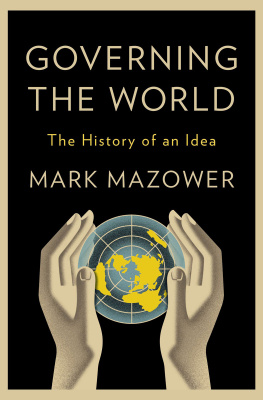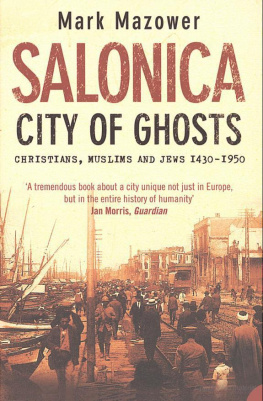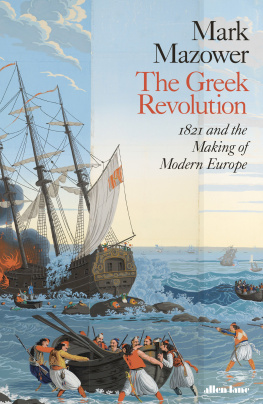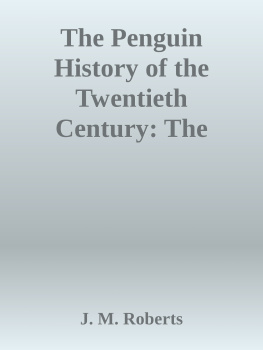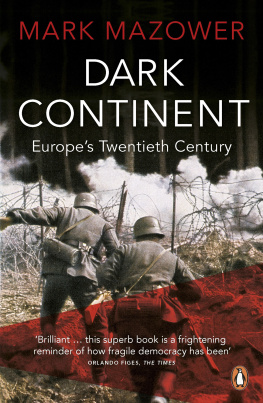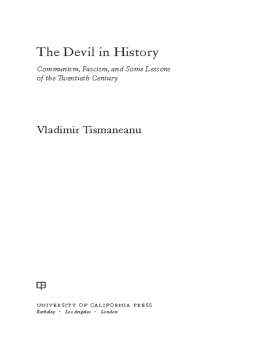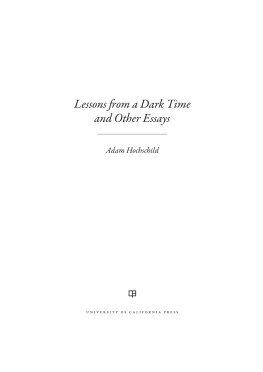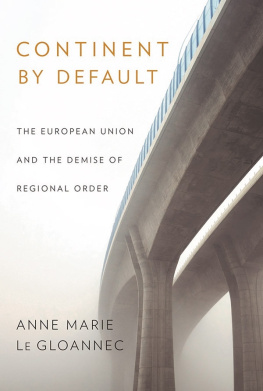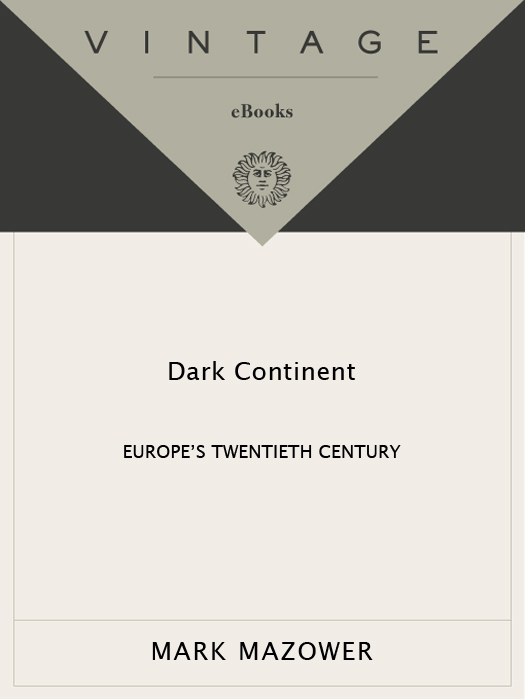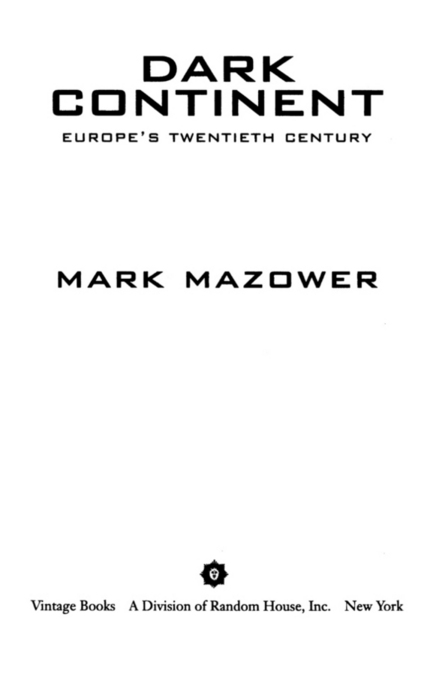ACCLAIM FOR
MARK MAZOWERs
DARK CONTINENT
Compelling. A lively account of Europe in the twentieth century.
The Wall Street Journal
Fine and fascinating. Mazower uses his considerable skills to look deep into the heart of European darkness, and he does not flinch from what he finds.
Chicago Tribune
Mark Mazower has provided a rich mixture in his highly individual and intelligent interpretation of Europes twentieth-century history.
The Times Literary Supplement
Mazower has written a timely, argumentative, and ultimately optimistic book; he is particularly good at illuminating the substance of beliefs beneath ideologies.
The New Yorker
An absorbing and challenging history of Europe in the twentieth century. [Mazower] is a skilled analyst and persuasive writer.
Pittsburgh Post-Gazette
Fascinating.
The Washington Times
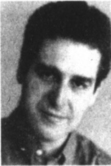 MARK MAZOWER
MARK MAZOWERDARK CONTINENT
Mark Mazower has taught at the University of Sussex and Princeton, and is Professor of History at Birkbeck College, University of London. He is the author of the prize-winning Inside Hitlers Greece: The Experience of Occupation, 19411944.
ALSO BY
MARK MAZCWER
Greece and the Inter-War Economic Crisis
Inside Hitlers Greece:
The Experience of Occupation, 194144
Copyright 1998 by Mark Mazower
All rights reserved under International and Pan-American Copyright Conventions.
Published in the United States by Vintage Books, a division of Random House, Inc.,
New York, and simultaneously in Canada by Random House of Canada Limited,
Toronto. Originally published in hardcover in Great Britain by Allen Lane/
The Penguin Press, an imprint of the Penguin Group, London and
subsequently in hardcover in the United States by Alfred A. Knopf,
a division of Random House, Inc., New York, in 1998.
Vintage and colophon are registered trademarks of Random House, Inc.
Grateful acknowledgment is made to the following for permission to
reprint previously published material:
Harcourt Brace & Company: Map, The Expulsion of Germans from Central Europe, 19451947, from Europe in the Twentieth Century, 2nd ed., by Robert O. Paxton, copyright 1985 by Harcourt Brace & Company. Reproduced by permission of the publisher. Helicon Publishing Limited: Two maps, Retreat of Ottoman Power in Europe and Russia in the Great War, from The History of Europe by J. M. Roberts, copyright 1996 by Helicon Publishing Limited. Reproduced by permission of the publisher. Penguin Books Limited: Map, The Multinational Empire, 18781916, from The Hapsburgs: Embodying Empire by Andrew Wheatcroft (Viking, 1995), copyright 1995 by Andrew Wheatcroft. Reproduced by permission of the publisher. The University of Chicago Press: Table 2.1, Foreign Population in Selected European Countries, from Limits of Citizenship by Yasemin Nuhoglu Soysal, copyright 1994 by The University of Chicago Press. Reproduced by permission of the publisher.
The Library of Congress has cataloged the Knopf edition as follows:
Mazower, Mark.
Dark Continent: Europes twentieth century / Mark Mazower.1st American ed.
p. cm.
1. Europe History 20th century. I. Title. II. Series.
D424.M39 1998
940.55 DC21 9815886
eISBN: 978-0-307-55550-2
Author photograph by Johanna Weber
www.vintagebooks.com
v3.1
for Ruthie
And In Memory Of
Frouma Mazower Max
Mazower
Reg Shaffer
CONTENTS
PREFACE
Why then do the European states claim for themselves the right to spread civilization and manners to different continents? Why not to Europe itself?
JOSEPH ROTH, 1937
Europe may seem to be a continent of old states and peoples, yet it is in many respects very new, inventing and reinventing itself over this century through often convulsive political transformation. Some nationssuch as Prussiahave been wiped off the map in living memory; otherslike Austria or Macedoniaare less than three generations old. When my grandmother was born in Warsaw, it was part of the Tsarist empire, Trieste belonged to the Habsburgs and Salonika to the Ottomans. The Germans ruled Poles, the English Ireland, France Algeria. The closest much of Europe came to the democratic nation-state which has become the norm today were the monarchies of the Balkans. Nowhere did adults of both sexes have the vote, and there were few countries where parliaments prevailed over kings. In short, modern democracy, like the nation-state it is so closely associated with, is basically the product of the protracted domestic and international experimentation which followed the collapse of the old European order in 1914.
The First World War mobilized sixty-five million men, killed over eight million and left another twenty-one million wounded; it swept away four of the continents ancient empires and turned Europe into what Czech politician Thomas Masaryk described as a laboratory
In the short run, both Wilson and Lenin failed to build the better world they dreamed of. The communist revolution across Europe did not materialize, and the building of socialism was confined to the Soviet Union; the crisis of liberal democracy followed soon after as one country after another embraced authoritarianism. By the late 1930s the League of Nations had collapsed, the Right was ascendant, and Hitlers New Order looked like Europes future. Against the liberal defence of individual liberties the Nazis counterposed the racial welfare of the collectivity; against liberalisms doctrine of the formal equality of states it offered Darwinian struggle and rule by racial superiors; against free trade it proposed the coordination of Europes economies as a single unit under German leadership. Yet how bewilderingly fast fortunes changed in the struggle of ideologies. In the 1940sthe centurys watershedthe Nazi utopia reached its zenith, and then as swiftly collapsed. Fascism became the first major ideology to suffer conclusive defeat at the hands of the history it claimed to have mastered.
In the long run, the 1940s were important for another reason too. The exhausting, murderous experience of total warthe culmination of nearly a century of imperial and national struggles inside and outside the continentled to a growing weariness with ideological politics across the continent. The great tide of mass mobilization began to ebb, and with it the militarism and collectivism of the inter-war years.
Believers became cynics at worst, at best apathetic, resigned and domesticated. People rediscovered democracys quiet virtuesthe space it left for privacy, the individual and the family. Thus after 1945, democracy re-emerged in the West, revitalized by the challenge of war against Hitler, newly conscious of its social responsibilities. Only now it faced competition from the Left not the Right, as the Red Army, having crushed Nazi Germanys imperial dreams, brought communism to the new Soviet empire in eastern Europe.



